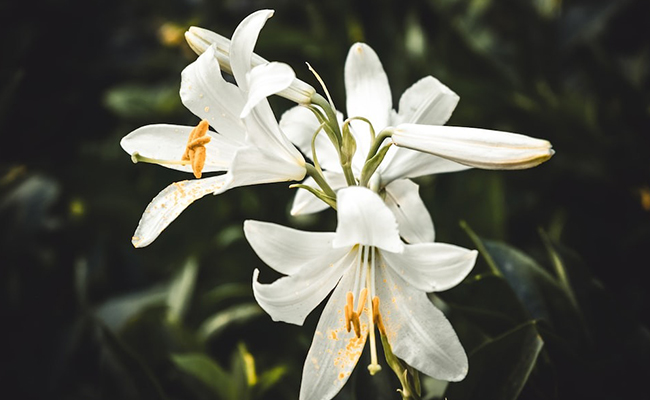The Fascinating Scientific Names of 10 Popular Flowers
Flowers have always been a source of fascination and beauty for humans. They come in different shapes, sizes, and colours and are used for various purposes, from decoration to medicinal use. Each flower has a scientific name that identifies its unique characteristics and properties. In this blog post, we will explore the flower with the scientific name of the top 10 common flowers and their interesting features.

1. Rose - Rosa Rubiginosa
The rose is a widely adored and highly popular flower across the globe. They come in a variety of colours and are commonly associated with love and affection. The scientific name of the rose is Rosa sp. The word 'sp.' stands for 'species,' which means that there are different types of roses. Roses belong to the Rosaceae family and are widely cultivated for their beauty, fragrance, and commercial value.

2. Lily - Lilium
Lilies are another popular flower known for their beauty and fragrance. They have a trumpet-like shape and come in different colours, including white, pink, and yellow. The scientific name of the lily is Lilium sp. Lilies belong to the Liliaceae family and are native to temperate regions of the northern hemisphere. They are commonly used in bouquets, wedding arrangements, and as a decorative plants in gardens.

3. Sunflower - Helianthus annuus
Sunflowers are known for their vibrant yellow colour and are commonly found in gardens and fields. They have a large central disk surrounded by petals that resemble the rays of the sun. The sunflower’s botanical name is Helianthus annuus. 'Helianthus' means 'sunflower' in Greek, while 'annuus' means 'annual,' indicating that sunflowers are an annual plant that grows and flower within a year.

4. Orchid - Orchidaceae
One of the most intriguing and varied types of flowers is the orchid. They come in different shapes, sizes, and colours, and some species are known for their unique fragrance. The scientific name of the orchid is Orchidaceae, which is also the name of the family to which they belong. Orchids can be found in diverse regions across the world, ranging from tropical rainforests to arctic tundra.

5. Jasmine
Jasmine is a fragrant flowering plant that belongs to the olive family, Oleaceae. Jasmine's scientific name is Jasminum, which is derived from the Persian word "Yasmin," meaning "gift from God." Jasmine's natural habitat includes tropical and subtropical regions of Eurasia, Africa, and Oceania, where more than 200 species of this fragrant flowering plant are found. The most commonly cultivated species is Jasminum officinale, which is also known as common jasmine or poet's jasmine. This species is prized for its sweet fragrance and delicate white flowers.

6. Daisy - Bellis perennis
Daisies are a common and beloved flower known for their simple and cheerful appearance. They have white petals with a yellow central disk and are commonly found in gardens and meadows. The scientific name of the daisy is Bellis perennis. 'Bellis' means 'pretty' in Latin, while 'perennis' means 'everlasting,' indicating the flower's ability to bloom throughout the year.

7. Tulip - Tulipa
Tulips are a popular flower known for their bright colours and elegant shape. They have cup-shaped petals and come in a variety of colours, including red, yellow, and pink. The scientific name of the tulip is Tulipa sp. The word 'sp.' indicates that there are different species of tulips, and they belong to the Liliaceae family. Tulips are native to central Asia and are widely cultivated for their beauty and commercial value.

8. Marigold - Tagetes
Marigolds are a popular flower known for their bright colour and pungent smell. They have a distinctive orange or yellow colour and are commonly used in floral arrangements and for medicinal purposes. Marigold scientific name is Tagetes sp. The word 'sp.' indicates that there are different species of marigolds, and they belong to the Asteraceae family. Marigolds are native to Mexico and Central America and are widely cultivated for their beauty and pest-repelling properties.

9. Carnation - Dianthus caryophyllus
Carnations are popular flowers known for their ruffled petals and spicy fragrance. An assortment of colours is available for orchids, such as white, pink, and red. The scientific name of the carnation is Dianthus caryophyllus. 'Dianthus' means 'divine flower' in Greek, while 'caryophyllus' means 'spicy-scented,' indicating the flower's unique fragrance. The Mediterranean region is the native home of carnations, which are classified under the Caryophyllaceae family.

10. Chrysanthemum - Chrysanthemum
Chrysanthemums are popular flowers known for their beautiful blooms and long vase life. Jasmine is available in a range of hues, such as yellow, white, and pink. The scientific name of the chrysanthemum is Chrysanthemum sp. The word 'sp.' indicates that there are different species of chrysanthemums, and they belong to the Asteraceae family. Chrysanthemums are native to Asia and are widely cultivated for their beauty and medicinal properties.

The flower botanical name of flowers not only identifies their unique characteristics but also adds to their beauty and fascination. From roses to chrysanthemums, each flower has a distinct scientific name that highlights its special features and properties. Understanding the scientific names of flowers can also help us appreciate their cultural significance and the role they play in different parts of the world. So, the next time you come across a beautiful flower, take a moment to appreciate its scientific name and the wonder of nature that it represents.















